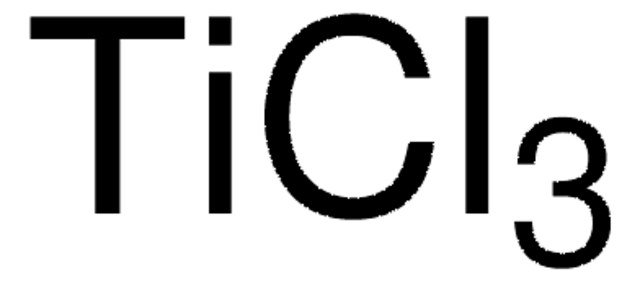208566
Titanium(IV) chloride
ReagentPlus®, 99.9% trace metals basis
Synonyme(s) :
TTC, Titanium tetrachloride
About This Item
Produits recommandés
Pression de vapeur
50 mmHg ( 55 °C)
9.6 mmHg ( 20 °C)
Niveau de qualité
Gamme de produits
ReagentPlus®
Pureté
99.9% trace metals basis
Forme
liquid
Pertinence de la réaction
reagent type: catalyst
core: titanium
Point d'ébullition
135-136 °C (lit.)
Pf
−25 °C (lit.)
Densité
1.73 g/mL at 20 °C (lit.)
Chaîne SMILES
Cl[Ti](Cl)(Cl)Cl
InChI
1S/4ClH.Ti/h4*1H;/q;;;;+4/p-4
Clé InChI
XJDNKRIXUMDJCW-UHFFFAOYSA-J
Vous recherchez des produits similaires ? Visite Guide de comparaison des produits
Description générale
Application
- carboxylic acid and acyl chloride to alcohols
- carboxamides, oximes and lactams to amines
- sulfoxides to sulfides
Informations légales
Mention d'avertissement
Danger
Mentions de danger
Classification des risques
Acute Tox. 1 Inhalation - Eye Dam. 1 - Skin Corr. 1B - STOT SE 3
Organes cibles
Respiratory system
Risques supp
Code de la classe de stockage
6.1B - Non-combustible acute toxic Cat. 1 and 2 / very toxic hazardous materials
Classe de danger pour l'eau (WGK)
WGK 1
Point d'éclair (°F)
Not applicable
Point d'éclair (°C)
Not applicable
Certificats d'analyse (COA)
Recherchez un Certificats d'analyse (COA) en saisissant le numéro de lot du produit. Les numéros de lot figurent sur l'étiquette du produit après les mots "Lot" ou "Batch".
Déjà en possession de ce produit ?
Retrouvez la documentation relative aux produits que vous avez récemment achetés dans la Bibliothèque de documents.
Les clients ont également consulté
Notre équipe de scientifiques dispose d'une expérience dans tous les secteurs de la recherche, notamment en sciences de la vie, science des matériaux, synthèse chimique, chromatographie, analyse et dans de nombreux autres domaines..
Contacter notre Service technique










